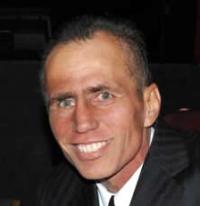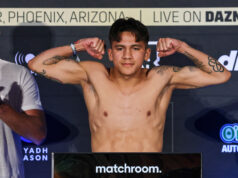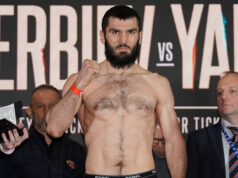
By now you’ve read reminiscences of Genaro Hernandez from men who knew him far better than I did. Some covered his matches, others worked with him in broadcasting, a few were his promoters. This, by contrast, is not an adequate eulogy but an account of three memorable encounters with “Chicanito” and what they taught me about the man and his profession.
His profession, of course, was prizefighting. And the man, a two-time world champion, succumbed to rhabdomyosarcoma, a rare form of cancer, last Tuesday, at the age of 45. Services for him will be held on Monday in East Los Angeles’ Resurrection Church at 11 AM. They are open to the public.
The day L.A. Boxing-Ahwatukee opened in Phoenix, I knew Genaro Hernandez only as the man who had lost to Floyd Mayweather nine years before. Jason Bress changed that directly. Jason was the head instructor at L.A. Boxing and a Muay Thai fighter who’d begun as a collegiate wrestler and later learned how to box from Genaro. Jason treated few men with reverence, but nobody ever said an unkind word about Genaro in front of Jason.
Later I would learn that nobody ever said an unkind word about Genaro in front of anyone, but I didn’t know it the day I met him.
That was March 31, 2007. It was L.A. Boxing-Ahwatukee’s grand opening. As a means of honoring his teacher, Jason asked Genaro to fly in from California. If you didn’t know who Genaro Hernandez was when you walked in that gym, it became quickly apparent. There was a professional on the speed bag doing things nobody had done on that bag in the gym’s first month and never did rival in the next three years of trying. Genaro was in the back of the gym, better dressed than most, hitting the bag with his elbow and head while spinning underneath it.
He had not fought professionally in nearly a decade but wasn’t a six-week training camp from being a super featherweight, despite standing 5 foot 11 inches. He happily fielded questions about most anything and gave serious answers.
Back then, the world was awaiting “The Word Awaits” because it was going to save boxing. The conventional wisdom was that Floyd Mayweather was a better fighter but a victory for Oscar De La Hoya would be better for the sport. Genaro doubted that.
“Wait, you want Oscar to win?” Genaro said. “I don’t know about that. Floyd’s real. I could text message Floyd right now, and he’d reply. Floyd’s a real person.”
If Genaro’s confidence in Mayweather’s character has not been entirely justified – though there are reports Mayweather is covering all funeral costs for the Hernandez family – his questions about De La Hoya’s character were indeed prophetic.
Fifteen months later, Jason Bress made a comeback fight in California. Though it was not a boxing match, and though he had not trained properly for it, he asked Genaro to work his corner. The match ended on an early stoppage Jason lost because of cuts.
I saw Genaro a month later in the media center at MGM Grand before Antonio Margarito’s fight with Miguel Cotto. I wandered over and shook his hand and reminded him of when and where we’d met. He cut me off, smiled, and said, “I remember you.”
I told him I’d heard Jason’s side of what happened in that comeback fight but wondered what Genaro had seen. He was dismayed at Jason’s conditioning. He said you could tell Jason did not want to fight when he complained about fouling.
“He came back to the corner and said the other guy was butting,” Genaro said, and then his face changed, and he grabbed my near shoulder and raised his left thumb. “I told him, ‘Then you take your thumb and you shove it in his eye, right to his brain! This is a fight, man.’”
I have often marveled at the chasm between how fighters are when fighting and when not fighting. These vicious men are the truest and gentlest souls I’ve met. No chasm, though, was greater than what Genaro showed me that day.
In an instant, he was in a fight, someone else’s, even, and ready to hurt another man. A moment later, he was back to his kind, debonair self. We talked a little longer, and he gave me the small handshake and large, genuine smile that was his signature.
A few months later, Jason Bress came in the gym distraught. He’d learned of Genaro’s cancer. Jason was “hard core” in the strict sense of the term. When you met him, he came off as a mean little fighter who disdained you. Then you got to know him, and he turned out to be a careful and empathetic guy. Then you really got to know him, and he was a mean little fighter who disdained you. He was hard at his core.
But he was sad the day he told us about Genaro’s cancer. Our gym had a better grasp on how things would go than the optimistic coverage Genaro’s announcement brought. Our co-owner, Allen Shellenberger, the drummer from the rock band Lit, had been diagnosed with brain cancer months before. After chemotherapy, he appeared at a June fundraiser and wasn’t the same person at all.
The final time I saw Genaro was at Mandalay Bay in July. He had aged considerably. He was no longer wiry but frail. He had little hair. He was at ringside doing a broadcast. After the fight, I tapped him on the shoulder and shook his hand. We talked about Jason Bress and that L.A. Boxing grand opening. We briefly reminded each other of a better time.
Now, Allen is gone, passed away at age 39. Jason was fired and returned to California. And now Genaro has passed on, too. That day in March of 2007 holds nothing but sadness. Boxing’s brutality does not stop at the apron.
Bart Barry can be reached at bbarry@15rounds.com









